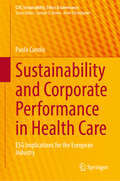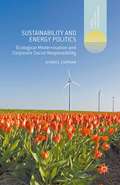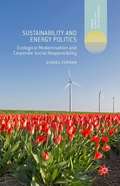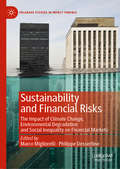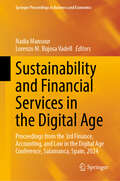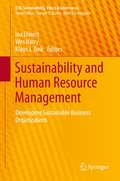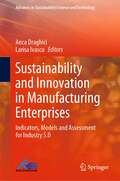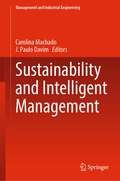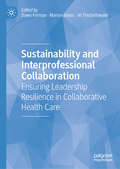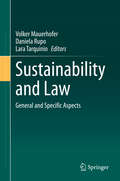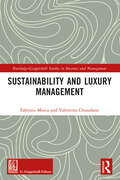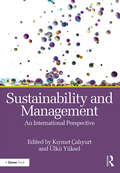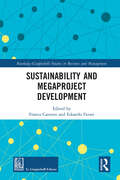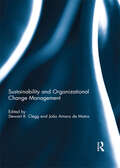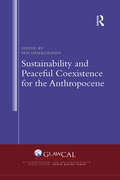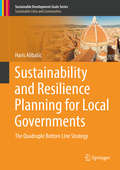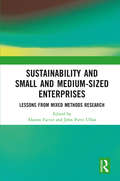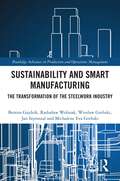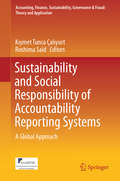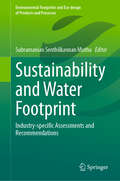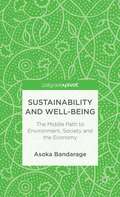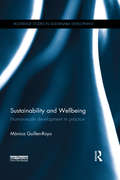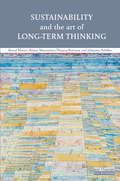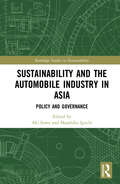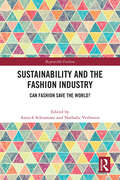- Table View
- List View
Sustainability and Corporate Performance in Health Care: ESG Implications for the European Industry (CSR, Sustainability, Ethics & Governance)
by Paolo CandioThis book explores the multifaceted relationship between sustainability and corporate performance in health care by providing a review of the relevant policy and academic literature, together with novel quantitative evidence to support strategic and managerial decision-making. The book uniquely investigates whether and how improvements in sustainability-related activities and reporting, and respective ESG scores assigned by international rating agencies, are related to corporations’ economic and market performance. The potential development and expansion in private health care services and products, accelerated by the COVID-19 pandemic, calls for a new paradigm in the health care industry. After introducing the reader to the social and policy context for sustainable development and to various normative and market instruments used to assess sustainability and corporate performance, the book presents the results of statistical analyses conducted on a representative sample of top health care companies listed in European capital markets and draws conclusions about the profitability and effectiveness of sustainability- and ESG-related investments. There’s a current debate about whether investing in sustainability not only fulfills ethical obligations but also drives long-term value. The empirical literature often presents conflicting findings, particularly when it comes to scholars’ relatively limited evaluation of the health care industry. The book sheds new light on this proposition and offers guidance on sustainable decision-making in health care, making it relevant for researchers and professionals.
Sustainability and Energy Politics: Ecological Modernisation and Corporate Social Responsibility (Energy, Climate and the Environment)
by Giorel CurranThe author explores the fraught politics of energy transitions in an age of climate change. She does so through an ecological modernisation and corporate social responsibility lens which she contends shapes and underpins sustainability today. Case studies cover climate policy, unconventional gas and renewable energy.
Sustainability and Energy Politics: The Promises of Ecological Modernisation and Corporate Social Responsibility (Energy, Climate and the Environment)
by Giorel CurranSustainability and Energy Politics.
Sustainability and Financial Risks: The Impact of Climate Change, Environmental Degradation and Social Inequality on Financial Markets (Palgrave Studies in Impact Finance)
by Marco Migliorelli Philippe DessertineDespite growing discussions on the relationship between sustainability and finance, so far little attention has been given to the relation linking sustainability-related risks and financial risks. Climate change, environmental degradation and social inequality, among others factors, may indeed have considerable adverse impacts on financial actors and markets, and even have the potential to harm financial stability. Shedding light on the importance of the nexus between sustainability and financial risks, this book addresses the need for new industry and policy approaches. With insights from a skilled set of scholars in the finance field, this edited collection explores the effects of climate risks on the banking and insurance industries, the problem of stranded assets, the possible corporate risk management frameworks that could be used to control sustainability-related risks, the role of non-financial disclosure in fostering market discipline, and the policy actions needed to integrate sustainability considerations into prudential supervision. Tackling an interdisciplinary topic, this book will appeal to academics and practitioners within the finance, business and sustainability fields.
Sustainability and Financial Services in the Digital Age: Proceedings from the 3rd Finance, Accounting, and Law in the Digital Age Conference, Salamanca, Spain, 2024 (Springer Proceedings in Business and Economics)
by Nadia Mansour Lorenzo M. Bujosa VadellThis volume examines how innovation and digital transformation impact the financial and accounting sectors. Featuring selected contributions from the third ‘Finance, Accounting and Law in the Digital Age conference 2024’ held at the University of Salamanca, Spain, the contributions of this book explore the development of digital finance and the complicated equation between financial stability, the security of investors and financial consumers, sustainable finance, and support for innovation. Climate change and the exponential growth of technology have built an explosion of financial innovation. The digital revolution has recently reached the financial sector, protected by a specific regulatory environment. The volume describes how all areas of finance are now invested by new players who are transforming the banking and financial landscape to create a novel digital ecosystem.
Sustainability and Human Resource Management: Developing Sustainable Business Organizations
by Ina Ehnert Wes Harry Klaus J. ZinkThe role of HRM in developing sustainable business organizations is increasingly attracting attention. Sustainability can be used as a principle for HRM itself and the tasks of Sustainable HRM are twofold. On the one hand it fosters the conditions for individual employee sustainability and develops the ability of HRM systems to continuously attract, regenerate and develop motivated and engaged employees by making the HRM system itself sustainable. On the other hand Sustainable HRM contributes to the sustainability of the business organizations through cooperation with the top management, key stakeholders and NGOs and by realising economic, ecological, social and human sustainability goals. This book provides a comprehensive review of the new area of Sustainable HRM and of research from different disciplines like sustainable work systems, ergonomics, HRM, linking sustainability and HRM. It brings together the views of academics and practitioners and provides many ideas for conceptual development, empirical exploration and practical implementation. This publication intends to advance the international academic and practice-based debates on the potential of sustainability for HRM and vice versa. In 19 chapters, 26 authors from five continents explore the role of HRM in developing economically, socially and ecologically sustainable organizations, the concept of Sustainable HRM and the role of HRM in developing Sustainable HRM systems and how sustainability and HRM are conceptualized and perceived in different areas of the world.
Sustainability and Innovation in Manufacturing Enterprises: Indicators, Models and Assessment for Industry 5.0 (Advances in Sustainability Science and Technology)
by Anca Draghici Larisa IvascuThis book informs and educates readers about sustainable development management, approaches and applications in manufacturing processes and presents the trends to the next economic and social paradigm: the Industry 5.0 and Society 5.0. Educational aspects, case studies from various companies, together with the analysis and synthesis of the literature and empirical experiences, define the content of the eleven chapters. Thus, this material could be considered as a starting point and foundation for researchers and practitioners interested in the present state and the evolution of the manufacturing systems. The book offers various points of view regarding the actual digital transformation of the manufacturing system.
Sustainability and Intelligent Management (Management and Industrial Engineering)
by J. Paulo Davim Carolina MachadoThis book presents contributions of intelligent management theories and models for a more effective management of sustainable business practices in competitive, profitable and socially responsible organizations. It communicates the latest developments and thinking on the sustainability and intelligent management subjects worldwide, increasing the knowledge and effectiveness of all those involved in these areas whether in the profit or non-profit sectors or in the public or private sectors.
Sustainability and Interprofessional Collaboration: Ensuring Leadership Resilience in Collaborative Health Care
by Marion Jones Jill Thistlethwaite Dawn FormanThis book is the fourth in the series on leadership, interprofessional education and practice, following on from Leadership Development for Interprofessional Education and Collaborative Practice (2014), Leadership and Collaboration: Further Developments for IPE and Collaborative Practice (2015) and Leading Research and Evaluation in Interprofessional Education and Collaborative Practice (2016). Along with policy changes around the globe, these three books have stimulated experts in this area to consider not only the ways in which they introduce and develop interprofessional education and collaborative practice, but also how they evaluate their impacts. In this 4th book, the focus is on the sustainability of these initiatives, sharing insights into factors that promote sustainability including leadership approaches and organisationsal resilience, as well as frequently encountered difficulties, and ways to overcome them.
Sustainability and Law: General and Specific Aspects
by Volker Mauerhofer Daniela Rupo Lara TarquinioThe book discusses sustainability and law in a multifaceted way. Together, sustainability and law are an emerging challenge for research and science. This volume contributes through an interdisciplinary concept to its further exploration. The contributions explore this exciting domain with innovative ideas and replicable approaches. It combines a variety of authors, from both the public and the private sectors, and thereby guarantees a broad view that enshrines the more theoretical arguments from the academic side as well as stronger practical applicable perspectives. The book provides space for thoughtful expansions of established theories as well as the hopeful emergence of innovative ideas. Moreover, the combination of three to five contributions into the eleven parts respectively aims toward a compression of like minded thoughts. This should lead to an intensification of exchange of viewpoints from different angles on a similar theme. Readers therefore also have the opportunity to concentrate on single chapters, but receive comprised knowledge and a variety of thoughts for new ideas on a particular theme.
Sustainability and Luxury Management (Routledge-Giappichelli Studies in Business and Management)
by Fabrizio Mosca Valentina ChiaudanoRecently, sustainability has become a focal point for companies across all sizes and sector, and the luxury industry is no exception. This shift reflects a growing awareness of the environmental, social, and community impacts of business activities. However, integrating sustainability into the luxury industry poses unique challenges due to the apparent mismatch between luxury and sustainability. While luxury often connotes indulgence and opulence, sustainability emphasizes altruism, ethical practices, and moderation, seemingly conflicting with traditional luxury values. This book, first attempts to resolve the abovementioned divergence between luxury and sustainability. Thanks to an in-depth analysis of the definition of luxury, the authors demonstrate that sustainability is in line with the young consumers’ idea of luxury. Moreover, leveraging a structured review, the book organizes the scientific production on sustainable luxury in the research area and explains the reasons for matching luxury and sustainability. Then this book also attempts to explain to what extent luxury brand companies are improving their commitment to sustainable actions. In this endeavor, the authors explore the fundamental issues within sustainable luxury and the integration of sustainability into the corporate business model. The explorations also include the companies’ efforts to communicate sustainability both offline and online with a focus on the themes and tools. Finally, this book offers a benchmark by providing the audience with several business cases. The discussion of case studies aims to meet the needs of a wide and varied audience, from university students to CSR managers looking to extract valuable insights and adapt them to their respective business contexts.
Sustainability and Management: An International Perspective
by Kıymet Çalıyurt Ülkü YükselIn the wake of the 1987 Brundtland Report, sustainable development has become key to the management systems within businesses, and a means by which companies can increase their long-term value. Being a ‘sustainable company’ increasingly means ‘staying alive in business’ and has become a necessity for all kinds of enterprises, from the micro-sized to global corporations. In more recent years, many companies, and indeed governments, have looked at sustainability as a means to combat the multiple challenges of environmental accidents, global warming, resource depletion, energy, poverty and pollution. However, being sustainable or maintaining sustainability is not an easy task for a company’s management function. It needs continuous support and engagement from the board, the executive management, staff and other stakeholders alike. Additionally, it brings extra costs to the company in terms of hiring trained staff, organising continuous training in the company, publishing sustainability reports and subscribing to a rating system. Sustainability must be nourished by a company’s board as well as by all of its departments, such as accounting, marketing and human resources. By the same token, it is not enough for a company simply to declare itself a ‘sustainable business’ or rely on past measures and reputation; sustainability is an ongoing activity and one which has to be proved by periodically disclosing sustainability reports, according to international rating systems. In Sustainability and Management: An International Perspective, Kıymet Çalıyurt and Ülkü Yüksel bring together international authors from a variety of specialisations to discuss the development, aspects, problems, roadmap, trends and disclosure systems for sustainability in management. The result is a lively, insightful exposition of the field.
Sustainability and Megaproject Development (Routledge-Giappichelli Studies in Business and Management)
by Franca Cantoni Edoardo FavariMegaprojects, also referred to in the literature as Large Engineering Projects or Major Projects, are generally defined as large-scale investment initiatives worth 1b€/$ or more and, facing similar problems independent of the country where they are implemented and the industry they belong to. The common feature of most megaprojects is that they are difficult to design and manage so that their realization and completion is always extremely expensive, often over budget and delivery deadlines also are not met. In the worst-case scenario, they remain unfinished. This book, through its multidisciplinary approach, offers food for thought and alternative interpretations for the complex world of megaprojects. While much research has been conducted and differing approaches have been developed over the last 20 years, there is still a lot of debate surrounding the topic, and a holistic approach for effectively managing these initiatives is still missing. What is clear to all researchers and experts in the field is that a traditional-linear management approach is simply not sufficient, as at many stages of a megaproject, iterative and feedback effect occurs due to stakeholder involvement and increasing and continuous interaction between them. The book promotes the debate among all categories of stakeholders involved in the megaproject’s supply chain, in order to increase the awareness of complex phenomena relating to the critical issues and common problems they face, all over the world, and to seek performance improvement across the whole life cycle of a megaproject, including the selection, design, construction, operation and de- commissioning.The multidisciplinary approach cultivated in the book conveys an innovative way to study megaprojects and their inherent complexities.
Sustainability and Organizational Change Management
by Stewart R. Clegg and João Amaro de MatosThere is no bigger challenge for organizational change management in the contemporary world than achieving greater sustainability. The challenges associated with sustainable development are multifaceted, including criteria pertaining to the delivery of environmental, social, ethical and economic results. Creating sustainable value requires companies to address issues that relate to pollution and waste, created by industrialization; to respond in a transparent manner to the challenges increasingly raised by the civil society, namely NGOs; to invest in emerging technologies that provide innovative solutions to many of today’s environmental problems; and to effectively respond to the challenges of increased poverty and inequality around the globe. On the other hand, to create shareholder value, managers must focus not only on cost reduction and risk control, but also on fostering innovation, enhancing corporate reputation within external stakeholders, and establishing a credible growth path for the future.The current global financial crisis has left few untouched: unprecedented unemployment figures, public deficits, bankruptcies, redundancies, austerity regimes, and governments bailing out banks all over the globe. World confidence is at a record low. How can management scholars encounter solutions for the dilemmas created by this scenario of change in which they can manage to change sustainably? This book provides some answers to these pressing questions. This book was originally published as a special issue of the Journal of Change Management.
Sustainability and Peaceful Coexistence for the Anthropocene (Transnational Law and Governance)
by Pasi HeikkurinenThe rapid industrialization of societies has resulted in radical changes to the Earth’s biosphere and its local ecosystems. Climate scientists have recorded and forecasted worrying global temperature rises going back to the early twentieth century, while biologists and palaeontologists have suggested that the next mass extinction is on its way if the current rate of species loss continues. To avert further ecological damage, excessive natural resource use and environmental deterioration are challenges that humanity must deal with now. The human species has had such a significant impact on the natural environment that the present geological epoch can be referred to as the ‘Anthropocene’, the age of humans. The blame and responsibility for the prevailing unsustainability, however, cannot be assigned equally to all humans. To analyse the root problems and consequences of unsustainable development, as well as to outline rigorous solutions for the contemporary age, this transdisciplinary book brings together natural and social sciences under the rubric of the Anthropocene. The book identifies the central preconditions for social organization and governance to enable the peaceful coexistence of humans and the non-human world. The contributors investigate the burning questions of sustainability from a number of different perspectives including geosciences, economics, law, organizational studies, political theory and philosophy. The book is a state-of-the-art review of the Anthropocene debate and provides crucial signposts for how human activities can, and should, be changed.
Sustainability and Resilience Planning for Local Governments: The Quadruple Bottom Line Strategy (Sustainable Development Goals Series)
by Haris AlibašićThis book details a process of creating a long-term sustainability and resilience plan for local governments to use in designing and implementing sustainability and resilience-related policies, initiatives, and programs. It offers guidance and methods in applying sustainability and resilience strategies to attain the prosperity of organizations and communities. The recommendations in this book are based on the author's years of experience in directing applied resilience and sustainability planning for a local government, and years of research covering diverse aspects of sustainability and resilience from climate change, climate preparedness and readiness, quadruple bottom line strategy, greenhouse gas emission reduction policies, climate adaptation and mitigation to sustainable energy policies and initiatives. Chapter one defines terms related to sustainability and resilience and addresses how the topics reshape local governments and communities. Chapter two maps out the sustainability and resilience process for organizations and communities, determining the appropriate steps to be taken at each level of sustainability and resilience planning. Chapter three identifies community and organizational level engagement, with internal and external stakeholders, including designs necessary throughout these processes. Chapter four contains measuring, tracking, monitoring and reporting methods using the quadruple bottom line strategy, and developing a sustainability and resilience progress report to ensure accountability, transparency, and good governance. Then, chapter five details the implementation of a sustainability and resilience plan once it is established, describing potential programs and initiatives to achieve sustainable and resilient communities. Chapter six describes the intersection between sustainability and resilience, and chapter seven examines the tools and resources available to create a practical sustainability and resilience plan. Chapter eight concludes the text by addressing the future of sustainability and resilience, and complexities of the modern dynamics of the interconnected systems in cities, counties, and organizations, and recommends how local government administrators in their planning methods and strategies must consider these challenges.
Sustainability and Small and Medium-sized Enterprises: Lessons from Mixed Methods Research
by Aharon FactorIndustrialisation has brought great benefits to humankind but now, after 200 years of fossil fuel use, land clearance and pollution, the planet’s boundaries are being stretched to their limits. Going beyond these confines would have severe consequences for humankind. To prevent this from happening, government, corporate and community initiatives must focus on reducing the environmental impact of approximately 400 million small and medium-sized enterprises (SMEs), given that they produce approximately 70% of the world’s pollution, 60% of carbon emissions and have a significant impact on land. To date, research shows that SMEs have been environmental laggards and more needs to be understood to improve sustainability in the SME sector. Broadening the researcher’s methodological focus, beyond traditional singular approaches, improves knowledge generation and better informs policy and practice. This book paves the way by showing the reader that a mixed method research design is able to provide a deep, diverse and holistic understanding of sustainability and SMEs. Importantly, the book also provides an in-depth mapping of mixed method sustainability and SME research at a regional level. As this book is about environmental sustainability framed in a business context, it will be of interest to researchers, academics, students and those in industry who are enquiring about the environmental sustainability of SMEs.
Sustainability and Smart Manufacturing: The Transformation of the Steelwork Industry (Routledge Advances in Production and Operations Management)
by Radosław Wolniak Bożena Gajdzik Wieslaw Grebski Jan Szymszal Michalene Eva GrebskiThis book discusses three key aspects of business operations: sustainability, human factors, and smart manufacturing, which make up modern business. The authors share their experiences in the transformation of enterprises to Industry 4.0/5.0 and the sustainability of steel production, as well as the reorganization of human factors using the example of the steel sector. The steel industry is covered both from a global perspective (key producers in the global steel market), as well as from a local and sectoral perspective (the companies that make up the sector of metal and metal product producers, using Poland as an example).This insightful book discusses how the steel industry can develop intelligent solutions to enhance sustainable performance and the challenges they must overcome, including policy and regulation. Case studies evaluate how steel companies are investing in new technologies that meet environmental requirements but also human resource development to enhance digital skills and competencies of the workforce.The book will find an audience across disciplines but be of particular value to scholars of industrial, operations, and technology management.
Sustainability and Social Responsibility of Accountability Reporting Systems: A Global Approach (Accounting, Finance, Sustainability, Governance & Fraud: Theory and Application)
by Roshima Said Kıymet Tunca ÇalıyurtThis book explores sustainability and social responsibility from the point of view of accountability reporting systems. The contributions to this volume open up discussions about the theory and application of sustainability and social responsibility across various corporate sectors and assists the reader in applying sustainable corporate social responsibility reporting across those sectors. As a central theme, the book addresses how the theory and application in sustainability and social responsibility has different dimensions and aspects which are impossible to apply across different sectors. This point of view is supported by chapter contributions from countries around the world including Turkey, Serbia, Malaysia, United States, South Africa, Italy, China, Brasil, Romania, Serbia, Puerta Rico, Algeria. Academics worldwide will discover in Sustainability and Social Responsibility of Accountability Reporting Systems: A Global Approach the latest developments about corporate social responsibility and sustainability of accountability reporting systems.
Sustainability and Water Footprint: Industry-specific Assessments and Recommendations (Environmental Footprints and Eco-design of Products and Processes)
by Subramanian Senthilkannan MuthuThis volume offers background and a variety of cases dealing with the concept of water footprint. The first chapter provides an introduction to the concept of water footprint and how it can be used to evaluate efforts toward sustainability, conservation, and environmental cleanup and remediation. Special focus is given to wastewater treatment from housing and construction, agriculture, and other industries. This book will be useful to academics, professionals, and students who are striving to make industrial use of water and cleanup of byproducts more sustainable.
Sustainability and Well-Being: The Middle Path to Environment, Society, and the Economy
by Asoka BandarageA powerful social science analysis and a compassionate philosophical perspective to face the twin challenges of environmental sustainability and human well-being.
Sustainability and Wellbeing: Human-Scale Development in Practice (Routledge Studies in Sustainable Development)
by Mònica Guillen-RoyoThe idea that we can meet human needs and simultaneously conserve and even enhance the natural environment is an attractive one. Since the Brundtland report popularised a definition of sustainable development based on the concept of needs, there has been a widespread belief that it should be possible to achieve a good quality of life without compromising natural ecosystems. Sustainability and Wellbeing fills a gap in sustainable development studies by drawing on a range of case-studies to discuss the challenges and opportunities of using Max-Neef’s Human Scale Development (HSD) framework in practice. The first section presents the theory and the methodology of HSD in the context of related literature on sustainable development and wellbeing. The second section discusses applications of the HSD methodology with three different purposes: the design of sustainable development interventions; the engagement of researchers with communities or groups of people in sustainability processes and the consolidation of sustainable community initiatives. Finally, the third reflects on challenges and limitations of using the HSD approach to define strategies for sustainable development and concludes. This is an invaluable resource for researchers and postgraduate students in wellbeing, sustainability, sustainable development, and human development.
Sustainability and the Art of Long-Term Thinking (Routledge Studies in Sustainability)
by Thomas Petersen Bernd Klauer Reiner Manstetten Johannes SchillerDealing with time is intimately linked to sustainability, because sustainability, at its core, involves long-term ethical claims. To live up to them, decision and policy-making has to consider long-term development of society, economy, and nature. However, dealing with time and such long-term development is a notoriously difficult subject, both in science and, in particular, in practical decision and policy making. Rooted in philosophical and scientific reasoning, this book explores how the concept of time can be incorporated into effective practical action. The book describes a system and uses case studies to help sustainability practitioners and researchers consider the long-term consequences of our actions in a methodical way. The system integrates scientific and practical knowledge about time and temporal developments to help break down the sometimes overwhelming complexity of sustainability issues. Combining theoretical conceptual thinking and practical applications, this book will be of great interest to students and researchers of sustainability science, environmental sciences, sustainable development, environmental economics, political sciences and practical philosophy.
Sustainability and the Automobile Industry in Asia: Policy and Governance (Routledge Studies in Sustainability)
by Suwa Aki Iguchi MasahikoThis book provides a wealth of information and a critically required framework for sustainable automobile policy development in major Asian countries. It also gives wide-ranging policy options, ranging from technological to institutional solutions to automobile emission problems, based on empirical case studies and comparative policy and regulatory analysis. It is a useful reference with valuable insights on how rapidly changing economies are adopting their policy and regulatory structures to cope with the progressively severe environmental impacts of automobile increase.
Sustainability and the Fashion Industry: Can Fashion Save the World? (Responsible Fashion)
by Annick Schramme Nathalie VerbovenThere is widespread rhetorical agreement that the fashion industry must get itself onto a more ethical and sustainable footing. What does this mean in practice, and how can this be achieved in different regions around the world?This book brings together expert scholars and reflective practitioners via a network of dialogue and exchange to help drive forward an ethical and sustainable future for the fashion industry. With insights from fashion design, management, sociology, philosophy, education, heritage studies and policy, the book asks whether or not fashion can save the world.Enriched with illuminating case interviews and the perspective of experts, this book will be of interest to researchers and scholars in the fields of sustainable business and the fashion industry, and provides a unique resource for readers seeking to understand more about the need for responsible fashion.
